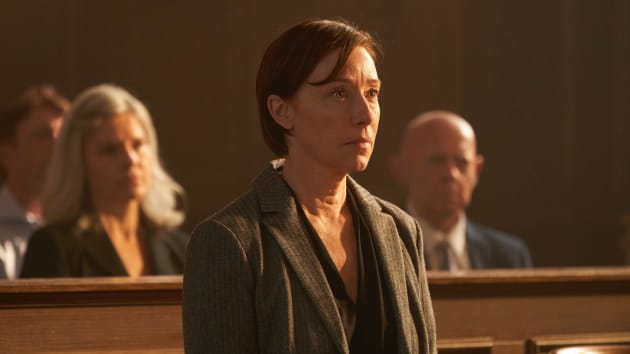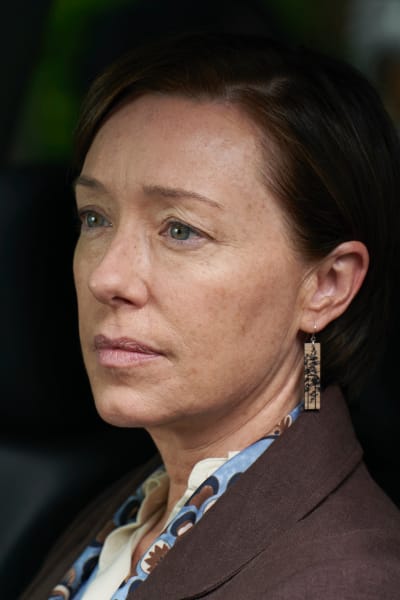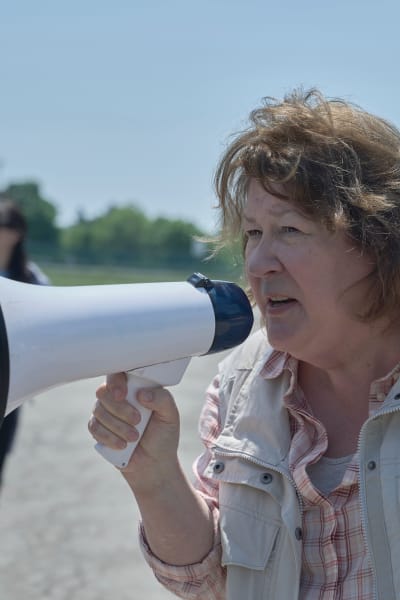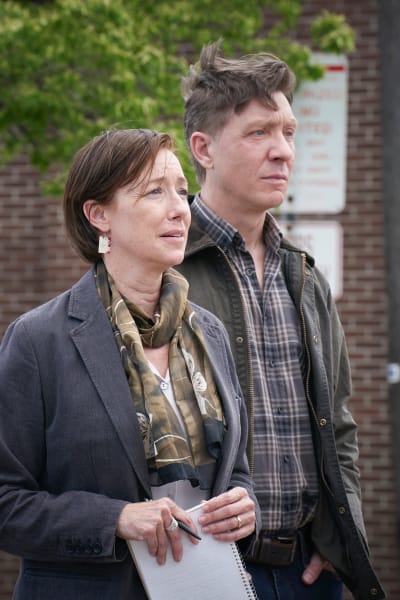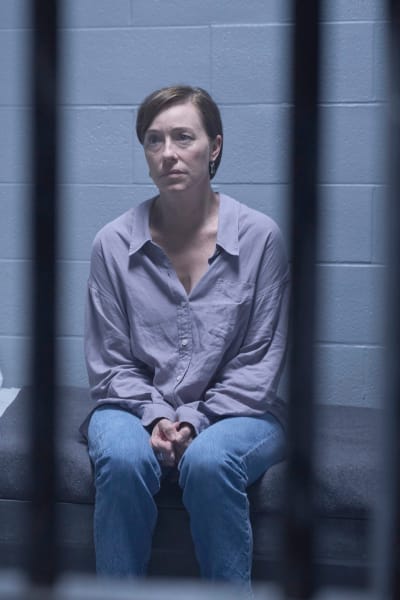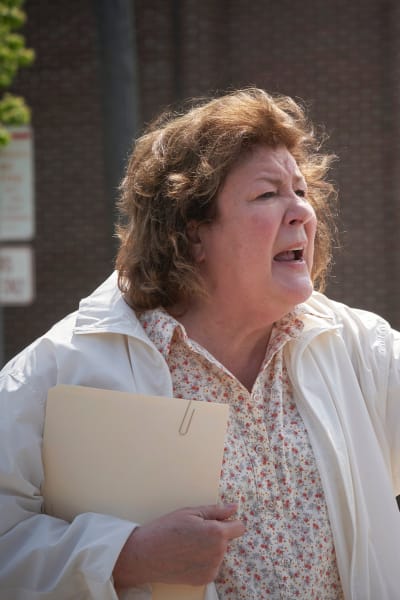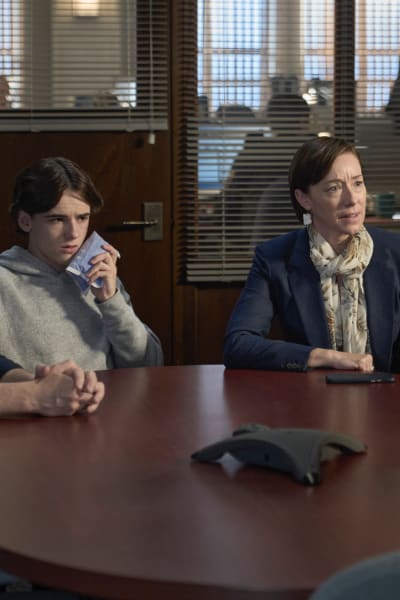Accused is nothing if not polarizing. Episode after episode, these different stories tell the tales of typically oppressed people tried in both the court of public opinion and the court of law. And each episode is spectacular.
The spectacle of this show is brought to a level of humanity by empathetic portrayals and heart-stopping moments. Accused Season 1 Episode 8 is no exception.
“Laura’s Story” shows us the desperation of a family who lost a child in a school shooting. Laura deals with her anger by taking to the public stage to lobby against assault weapons. This makes sense as her philosophy professor character needs retribution to right the wrong.
What she does in the aftermath is routine for Accused — she forsakes the mental health of her surviving son. The thread of untreated depression, anger, and adverse mental trauma in each episode of this show is strong, and the effects are often devastating.
Her son, Jonah, is ignored as she goes on her anti-gun campaign. Her need to fill her void with self-righteous indignation, however appropriate, is selfish and self-serving. She was still consumed by grief, as evidenced by her reaction to her TA’s compassion.
The episode displayed Laura’s anger more than it displayed her grief. Per the show’s theme, it was evident that someone would commit a crime, and we sat on the edge of our collective seats, waiting for the charge to be revealed.
We wondered what crime these innocent victims of violent crime could commit. But often, the perpetrators of violent crime were previously affected by violence. And though this is an extreme example, it still sheds light on the propensity for violence after traumatic experiences.
Truth doesn’t need us to believe it. It just is.
Margot Martindale portrayed a complex character who seemed to believe her delusions. People like this are rarely conscious of or held accountable for the snowball effect of their hate and vitriol.
Her character’s behavior would have been absurd if not for the literal droves of Q-Anon and conspiracy theorists who support and facilitate this type of outlandish behavior every day. It was infuriating that random citizens could question and engage with each other in such a way.
Martindale bought into the role and was as believable and despicable as Joanna Pierce. Her ability to devolve into such a hateful role is impressive, and her character is deeply disturbing.
These are the types of people who are not listening. They believe or spew what they want others to think, and they are dangerous.
Eric: We’ve been threatened Laura! Ok? And our principles aren’t going to keep us safe when one of them shows up on our doorstep.
Laura: Safe? Are you kidding me? This is what killed our son!
In this case, Joanna’s crusade put Laura’s family in immense danger. The need for the “truth” elicited an aggressively invasive hunt for the conspiracy theorists, and they came after the family with fervor.
Emotionally, it was taxing to see Laura’s one-track mind.
Her husband, Eric, was right when he said she was looking for a fight, but there was an imbalance of power in the household as she directed the family’s responses. She ruled the roost, and for that, she took the bulk of the blame.
Even as their community and loved ones distanced themselves, Laura’s anger felt justified, and she continued to fight. One can only imagine the helplessness she felt losing her child in such a dramatic and traumatic fashion. So, she held on to control what little she thought she could.
Her love for her children was apparent, but she did overlook Jonah until it was too late. He had to witness her losing control; again, no one considered what he felt as a result of this.
The weight of his circumstances took a toll on Jonah. Even without the conspiracy theorists, he seemed at a loss over his grief over losing his one blood relative. Liam was his younger brother, and he may have felt the need to protect him. That perceived failure could have been plaguing him.
Laura: What am I supposed to do?
Jonah: Ignore it, Mom. Like a normal person. This is how the internet works!
Laura: Yeah, I get that, Jonah. I’m not naive, but this is your brother. This is his memory. This is what comes up when you search Liam’s name.
Jonah: Yeah, well, somehow, I don’t think he cares.
Then Joanna and her crew set out to convince the public that his brother didn’t exist. Their smear campaign further erased Liam. And somehow, killing Joanna was akin to avenging his brother’s death.
His mindset was not explained or readily understandable. Laura taking the blame took away his accountability for the crime and his opportunity to get assistance for the rage he did not contain. As a final act to protect her child, Laura took a plea, and it was heartbreaking.
We don’t know that the vicious cycle of crime and violence is over.
Joanna was cruel, but she had the right to free speech and did not deserve to die. And even though Joanna was gone, there would always be another radicalized leader to take her place.
We don’t often consider the antagonist’s perspective, but this show’s premise opens the door to their viewpoint. The question then is why was Joanna so gung-ho in her attempts to defame the family? Do these people feel that someone is attacking their liberties?
You were right. I needed an enemy. I needed a fight. Because without that, there was just this giant gaping hole. I brought us here. I did that and I am not going to let him pay for that. We can’t lose him too.
Joanna’s compassion for Jonah when she found him in her closet seemed sincere, so there is a vantage point where she is the victim fighting for her rights. And some will watch this show, and that will be all they see.
Accused portrays the viewpoints of those commonly oppressed and overlooked by giving us a glimpse into their mindset and what made them commit the crime.
In most episodes, the offense directly responded to a perceived threat or untreated mental illness.
Accused has the tone and themes of a mini-movie, with the heart and soul of the defendants on the line with each episode. So far, most defendants have been sympathetic but rarely innocent.
What did you think of this episode?
Should Laura have let her son take accountability?
Was Laura to blame for Joanna’s death?
Drop your thoughts in the comments.
Brandi Powell is a staff writer for TV Fanatic. Follow her on Twitter.
